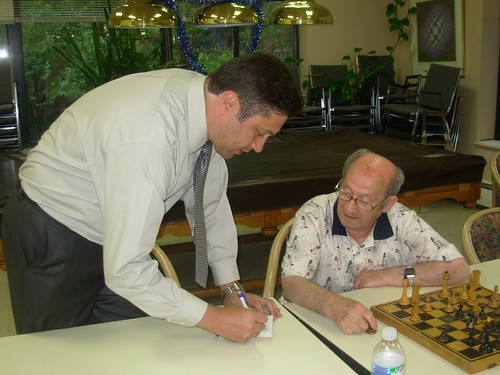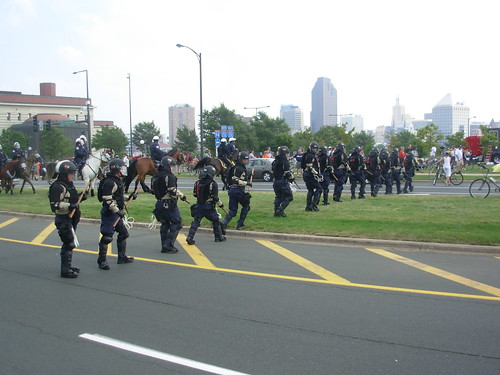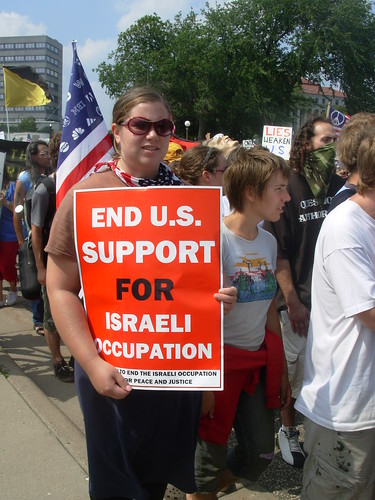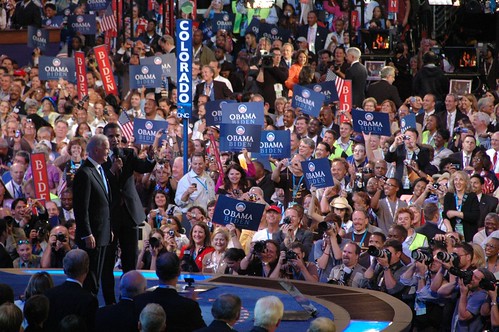This article was written by Antoine Faisal, publisher of the Arab American newspaper Aramica. He was part of a group of ethnic media journalists who covered the Democratic National Convention in Denver under the sponsorship of Feet in Two Worlds and the New York Community Media Alliance.
For weeks prior to the convention, the question on my mind was, ‘What do Arab Americans want – from the convention, from Obama, from the Democratic Party?’ I thought I could answer those questions with confidence but a shift has occurred both from within and outside our community that has significantly altered my perspective on our community’s place in the American political landscape.
At this year’s DNC, there were over 40 Arab Americans participating either as members of DNC standing committees or as delegates.
Former Congresswoman and current president of the American Arab Anti-Discrimination Committee Mary Rose Oakar served as the chairperson for the DNC Rules Committee (the committee responsible for proposing the Permanent Rules for the convention, adopting the proposed convention agenda and making recommendations for permanent convention officers) while Dr. James Zogby, founder of the Arab American Institute served as the Convener of the Democratic National Ethnic Coordinating Council (DNECC).
Also, the Obama campaign’s official website has launched an Arab American page.
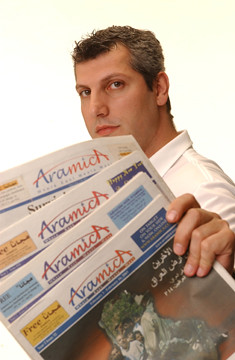
Antoine Faisal
Day One
It’s already a madhouse at the Sheraton – the main venue for caucuses, meetings, and major schmoozing. I am focused on finding people to answer my questions – the only people who can answer my questions – fellow Arab Americans: delegates, activists, politicians, attendees.
I have an itinerary I am supposed to follow but decide to fly solo and see where my curiosity takes me. I am handsomely rewarded for my journalistic knack of sniffing out a story when I run into an old friend of mine at the American Muslim caucus.
She invites me to tag along to a press briefing: ‘A Key Demographic in the Battleground States: Dr. James Zogby and Arab Americans at the Convention’ where, Eureka! The mother lode! Arab American delegates, activists, community leaders, and politicians – many whose faces and names have appeared in the pages of Aramica on numerous occasions – all in one room, psyched to be at the convention, and happy to answer my questions.
I spoke first with Ismael Ahmed, Director of the Michigan Department of Human Services and co-founder of the Arab Community Center for Economic and Social Services (ACCESS). Mr. Ahmed has been involved in politics as a community activist for the better part of 3 decades.
Far from being a convention newbie, this is his 7th time attending the DNC. He has sat on the Platform Committee and the Rules Committee, as well as having been a regular delegate 5 times. He is now the co-chair of the Michigan State Democratic Party.
Also at the briefing was Andre Sayegh, 6th Ward Councilman of Paterson, NJ. This was his first convention. Not a delegate, Mr. Sayegh traveled to Denver to support his party and his community.
Unity within Diversity
Given the rich diversity of the Arab American convention-goers, including Dr. Zogby, Mr. Ahmed, and Mr. Sayegh, the responses given by those who participated in my ‘survey’ were astonishingly similar both in content and tone, which was decidedly upbeat and confident.
Staunch Obama supporters; the general consensus is that Obama is an “extraordinary candidate” and that Arab Americans are going to play an important role in the outcome of this election and beyond. His views on the two-state solution to the Palestinian-Israeli conflict, and American withdrawal from Iraq are the only reasonable, realistic ones presented and what is right not just for Arab Americans but for the entire nation.
Senator Joe Biden is viewed as a good choice for vice president, even if there are issues on which he and Obama differ because, ultimately, it is Obama defining the ticket, not Biden. But Biden’s experience in the Senate and with foreign policy will be an advantage.
Nobody believes Arab American ‘issues’ are that different from any other American’s issues: healthcare, education, immigration, poverty, the economy – they are all matters of great importance to everyone and more importantly, of grave importance for our nation.
This, above all else, is what distinguished the Arab American delegates and community leaders at the DNC – their vision is inclusive, for the entire nation, not just for Arab Americans. They see a bigger picture – one in which Arab Americans do not stand alone but are an integral part of the Democratic Party and the nation.
Even on an issue of potential discord, such as the resignation of Mazen Al Asbahi as the Obama campaign’s Michigan outreach coordinator, there was unity of opinion that Mr. Al Asbahi took the high road, chose to stay involved, and that is what is important – not to focus on, as Mr. Ahmed described it, the inevitable, “bumps in the road,” we travel to reach our destination.
The 2008 Democratic National Convention – the finale after two years of fierce campaigning – was an historic occasion marking a truly monumental event: the first ever nomination of an African American by a major American political party.
A victory not just for African Americans, it marks a moment of arrival for all American minority groups – including Arab Americans – whose presence and participation at the 2008 Democratic National Convention will reverberate post-election, resulting in an even larger showing at the 2012 DNC. Quite an extraordinary accomplishment for one of the US’s smaller minority groups and one about which each and every one of us can be proud.



